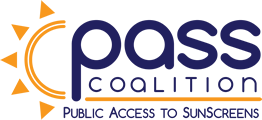Legislative Action
PURPOSE
The Public Access to SunScreens (PASS) Coalition is a multi-stakeholder coalition originally formed to advocate for a regulatory pathway to market for new, safe and effective sunscreen ingredients. The Coalition advocates for policies to help prevent skin cancer and improve public health by ensuring Americans have access to safe and effective sunscreens and evidence-based education on sun-safe practices.
BACKGROUND
FDA is responsible for ensuring the safety and effectiveness of all drugs. FDA’s authority over drugs includes medical claims related to sunscreens and sunscreen ingredients. Despite a number of OTC applications waiting for approval for several years, FDA has not completed the review of applications for any new sunscreen components. The most effective way of alleviating the current backlog, and preventing future instances, is for Congress to pass legislation that will call upon FDA to come to the negotiation table on final reforms.
Reforms mandated by Congress will help expedite approval of applications for components of OTC sunscreen products. Congress should reform the current sunscreen ingredient application process to ensure all sunscreens receive a transparent review within a predictable timeframe. This reformed process should include an expedited review of the backlog of sunscreen applications and establish a new process that allows future sunscreen ingredient applications to receive a decision within one year of submission. As a result, Americans will have access to the latest safe and effective sunscreen products.
OTC Monograph System
In 1972, FDA began reviewing OTC products already on the market not covered by new drug applications. FDA established review panels to evaluate OTC drugs on the market pre-1972 by category and developed monographs for each category of drug product. If an OTC drug meets the criteria established in a monograph, it is considered “generally recognized as safe and effective” or GRASE and does not need independent premarket approval. The existing OTC drug monographs are codified in 21 C.F.R. Part 330. Although several versions of a final monograph for sunscreen products have been developed, no final regulations have ever been implemented.
Establishment of TEA Application Process
In January 2002, FDA published a final rule establishing the TEA process to consider new applications for OTC products that were not covered by existing OTC monographs and to allow changes to the monographs to include new products or creation of new monographs. The final rulemaking stated that FDA “will strive to complete TEA applications in 90-180 days.”
The criteria for a product to be eligible to file a TEA application are:
-
Drug must be marketed for OTC purchase by consumers
-
Drug must have been marketed for use as an OTC product for a minimum of 5 continuous years in the same country and in sufficient quantity
FDA interpreted 5 continuous years of “use” as either in the United States or in a foreign country.
TEA Application Timeline
The TEA application process follows the following timeline:
-
Application. Applicant submits an application with basic chemical ingredients, a list of all the countries in which the OTC drug component has been marketed and for how long, and detailed information about how the OTC drug component has been marketed in those countries.
-
Notice of Eligibility. If FDA considers the drug eligible for consideration in the OTC monograph system, it publishes a Notice of Eligibility in the Federal Register and accepts public comment on the TEA application.
-
Public Comment. The applicant and other interested parties can submit public comments, including additional data to support or challenge safety and effectiveness.
-
Determination. FDA makes a determination whether the OTC drug component is GRASE.
-
Rulemaking. If an application is determined to be GRASE, FDA publishes a proposed rulemaking to either add the OTC drug component to an existing OTC monograph or create a new monograph. After public comment period, FDA publishes a final rule and the OTC drug component may be marketed.
